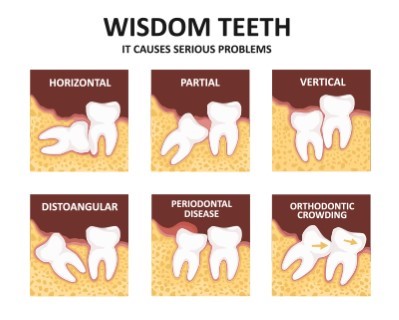Wisdom Teeth Removal
Purpose: Wisdom teeth removal, or third molar extraction, is a common surgical procedure to remove one or more of the four wisdom teeth. These teeth are the last to emerge, often causing crowding, impaction, or infection, which can lead to pain, swelling, or damage to adjacent teeth. Removing them can prevent or address these issues.
Procedure: During the procedure, the oral surgeon or dentist makes an incision in the gum to access the tooth. In some cases, the tooth may need to be broken into smaller pieces for easier removal. Once the tooth is extracted, the incision is closed with stitches, and the area is packed with gauze to help stop any bleeding.
Hospital/Clinic Stay: Wisdom teeth removal is typically done in a dental office or oral surgery center on an outpatient basis.
Duration of Hospital Stay: No hospital stay is required. The patient can go home after the procedure, usually within a few hours.
Type of Anesthesia: The procedure can be performed under local anesthesia, sedation, or general anesthesia, depending on the complexity of the extraction and the patient’s comfort level.
Travel After Procedure: Patients are advised to arrange for someone to drive them home after the procedure, especially if sedation or general anesthesia is used. It’s recommended to rest and avoid physical exertion for a few days.
Preparation Before Procedure: Before wisdom teeth removal, the dentist or oral surgeon will conduct a thorough examination, including X-rays, to assess the position and condition of the teeth. Patients should inform the dentist of any medications they are taking and follow pre-surgery instructions, such as fasting if general anesthesia is planned.
Duration of Procedure: The removal of wisdom teeth usually takes about 45 minutes to 1 hour, depending on the number of teeth being removed and the complexity of the procedure.
Recovery Time: Recovery from wisdom teeth removal can take a few days to a week. Patients may experience swelling, bruising, or discomfort for the first few days, with full healing taking several weeks. Pain medications and ice packs are often recommended to manage symptoms.
Estimated Cost: The cost of wisdom teeth removal varies depending on factors like the number of teeth being removed, the complexity of the surgery, and the type of anesthesia used. Costs can range around a few hundred dollars. It’s important to consult with the dentist or surgeon for a more accurate estimate.
Post-Procedure Care: After wisdom teeth removal, patients should follow the dentist’s post-operative care instructions, which may include avoiding hard or chewy foods, using ice packs for swelling, taking prescribed medications, and gently rinsing the mouth with salt water. Follow-up visits may be required to remove stitches and check the healing process.

